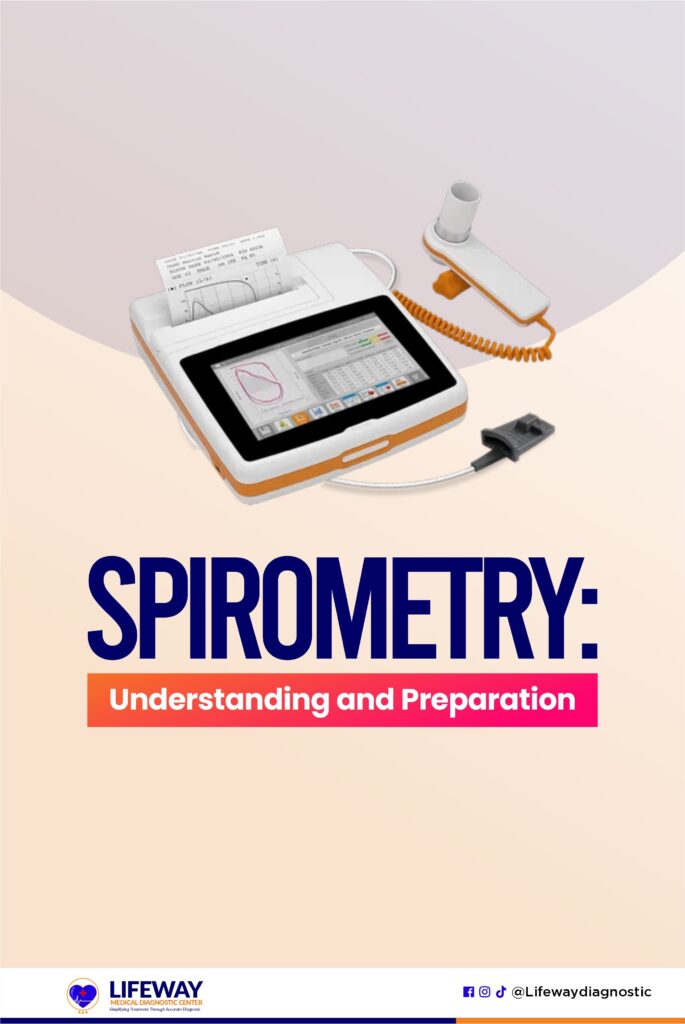Undoubtedly, spirometry is an essential test that plays an important role in evaluating the functionality of your lungs.

Spirometry, a type of pulmonary function test, is used to assess how effectively your lungs function, diagnose respiratory conditions, and monitor treatment effectiveness.
This safe procedure may involve repeated deep breaths, which can occasionally cause a slight sensation of lightheadedness or dizziness.
In this comprehensive guide, we will delve into the details of spirometry, including what it is, how it is performed, its benefits, and how you can prepare for the test.
What is Spirometry?
Spirometry is a lung function test that measures the volume and flow of air during breathing. It is a safe and straightforward procedure that can provide valuable insights into your lung health
It helps evaluate lung capacity, identify lung diseases, and monitor treatment effectiveness.
During spirometry, you will be asked to take a deep breath and then exhale forcefully into a device called a spirometer. A spirometer is a medical device used for a spirometry test.
The spirometer measures the volume and speed of air you can exhale, producing a graphical representation known as a spirogram.
Key Measurements Obtained from Spirometry
Spirometry aids in diagnosing respiratory conditions like asthma, COPD, and pulmonary fibrosis. It distinguishes between obstructive and restrictive lung diseases.
Below are the key measurements obtained from spirometry:
- Forced Vital Capacity (FVC): This is the maximum amount of air you can exhale forcefully after a deep inhalation.
- Forced Expiratory Volume in one second (FEV1): The volume of air exhaled during the first second of the FVC maneuver.
- FEV1/FVC ratio: The percentage of air exhaled in the first second compared to the total exhaled volume.
Common Health Conditions that Spirometry can help Diagnose
Some common conditions that spirometry can assist in diagnosing include:
1. Asthma:
It measures lung function and airflow obstruction, aiding asthma diagnosis, and treatment guidance.
2. Lung Cancer:
Spirometry assesses lung function before lung cancer treatment, helping determine a patient’s ability to tolerate surgery or other interventions.
3. Pulmonary Fibrosis:
This test detects restrictive lung diseases like pulmonary fibrosis by measuring reduced lung volumes and impaired function.
4. Sleep Apnea:
It helps identify airflow limitations during sleep, aiding in sleep apnea evaluation and diagnosis.
5. Chronic Obstructive Pulmonary Disease (COPD):
It plays a crucial role in diagnosing and distinguishing between chronic bronchitis and emphysema, which are the main components of Chronic Obstructive Pulmonary Disease (COPD).
Also, it helps in assessing airflow limitation severity and monitoring disease progression.
6. Cystic fibrosis:
It is vital for monitoring lung function and tracking cystic fibrosis progression, a genetic disorder impacting the lungs and other organs.
7. Chronic Bronchitis:
It helps to diagnose chronic bronchitis by assessing airflow limitation and identifying airway obstruction.
8. Occupational Lung Diseases:
Spirometry assesses lung function in individuals exposed to occupational hazards like dust, chemicals, or fumes, helping detect and monitor lung diseases such as occupational asthma or pneumoconiosis.
When would spirometry be needed?
Not sure when you need a spirometry test? These symptoms are indications that you need to see a pulmonologist for a spirometry test.
- Chest tightness, pain, or pressure.
- Difficulty taking a deep breath.
- Coughing, especially coughing with mucus.
- Wheezing.
- Shortness of breath.
If you are experiencing any of these symptoms, visit any medical diagnostic center near you for an effective diagnosis.
How to Prepare for Spirometry
Follow your healthcare provider’s instructions regarding the use of bronchodilators or inhalers before the test.
In some cases, you may be asked to withhold these medications for a specific period before the test.
Also, it is advised that you stay away from smoking or exposure to lung irritants, such as secondhand smoke or chemical fumes, before the test, as they may affect the results.
Avoid heavy meals or bloating foods before the test, as a full stomach can affect your lung capacity.
Wear loose-fitting clothing, and avoid clothes that may restrict your ability to take deep breaths.
Lastly, inform your healthcare provider about any existing respiratory conditions, recent illnesses, or surgeries, as they may influence the interpretation of the test results.
Conclusion
Spirometry is a vital tool in assessing lung function, diagnosing respiratory conditions, and monitoring treatment effectiveness. By understanding what spirometry entails and adequately preparing for the test, you can participate actively in your respiratory health management.
Follow the guidance provided by your healthcare provider, and don’t hesitate to ask questions or seek clarification.
Remember, spirometry is a safe and straightforward procedure that can provide valuable insights into your lung health, leading to improved diagnosis, management, and overall well-being.
